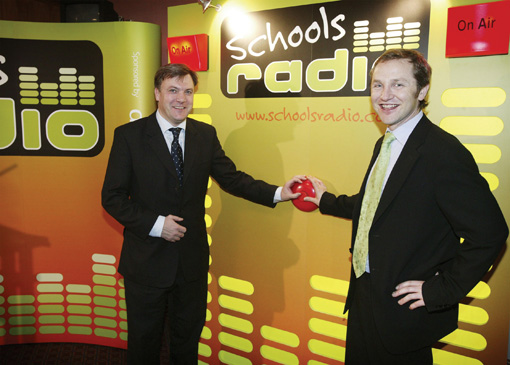SchoolsRadio aims to foster interest in radio particularly for dyslexic students and the visually impaired. Peter Thompson provides an overview of this project’s development and initiatives.
First published in Viewfinder 70.
The Vision Charity (http://visioncharity.co.uk/) is a volunteer organisation created in 1975 within the visual communications industry, which at that time was entirely involved in broadcast and business television. The objective was to generate funds to provide equipment and services to help dyslexic, visually impaired and blind children, through a series of fundraising events, culminating in the annual Vision Charity Ball. Since that time the charity has raised more than £3 million, all of which has been spent directly on these disadvantaged children.
The original idea for ‘schools radio’ goes back to the early 1990’s when Vision teamed up with the Radio Academy, an organisation founded by the BBC and independent broadcast radio providers, to develop training and education standards within the radio industry. The project was to create a series of workshops and lectures in schools and colleges around the UK designed to help raise interest by a new generation in the art of radio.
These workshops, which covered both creative and technical activities involved in radio broadcasting, were very successful. At that time we were dealing with analogue technology. Exceptionally talented students were invited to the annual Radio Academy Awards and Conference, then held in Birmingham. Many of these workshops were held in schools and colleges, including, among others, the Royal National College for the Blind, in Hereford and New College for the Blind in Worcester. Vision funded the visually impaired students, to enable them to take part in this project.
With the arrival of the internet, community web platforms with simple and easy access, digital audio and the increasing popularity of radio, it was felt opportune to develop the idea to that of encouraging schools to make their own podcasts/audio files or as we prefer, ‘radio programmes’, directly onto a PC or MP3 device and then upload the file onto their preferred web platform. At the same time, details of the programme are logged onto the schools radio website (www.schoolsradio.com) by the teacher responsible for the ‘production’, the information to include the name of the programme, description of content, the length and the URL (as a hot link). Teachers will be provided with information to help them get started and ultimately this scheme aims to make writers, technicians and presenters available to help develop skills and techniques required to be successful in any part of the radio business.

Ed Balls and James Purnell, former Secretary of State for Culture, Media and Sport, pressing the 'on-air button' to mark the moment of launch. (image: Vision Charity)
Through a process of marketing, direct email, exhibition, word of mouth and other communication means, more and more schools will be encouraged to take part, to make programmes and allow them to be downloaded by any interested school, college or student, to listen and be spurred on to make a programme in response, or a different point of view or experience, a different subject, whatever drives the interest and development forward. SchoolsRadio will feature examples of good practice and programming, which have been submitted, on a regular basis, to add further incentive.
Both Arqiva and Sony have expressed a willingness to provide a ‘Schools Radio’ award in their highly acclaimed annual awards events (Arqiva Commercial Radio Awards and the SONY/Radio Academy Radio Awards) and Vision Charity will provide a special award for the best programme to be submitted by a Visually Impairment or CresteD school/college.
The target age group will be 11 to 18 years, but all children in all schools will be encouraged to take part, with the emphasis on the latter age group, as a means of real engagement in line with the latest government policy to raise the age limit for full time education to 18 years. The teacher ‘buy in’ to this project is essential to its success. Vision Charity has the clear objective of helping to create a level playing field for dyslexic and visually impaired children, to get them involved in the use and creation of good audio communications, media awareness, the building greater self confidence and overcoming some of the obvious difficulties these young people endure.
Technical resources will vary from school to school, some having state of the art, professional audio recording equipment, a studio and trained staff, with full editing and special effects facilities. At the other end of the scale, there will be schools with just a single microphone recording onto a PC/Mac or MP3 type device.
All are capable of making a worthwhile ‘programme’. We will encourage taking ‘mobile’ equipment on location, to local businesses and organisations, using initiative to interview people of interest, with an experience or a story to tell. Clearly, we are aiming to raise standards technically and creatively and to help distribute the knowledge and experiences of the well-equipped establishments and of the professionals to all.
It is planned to organise a series of workshops, over the coming years, both on-line and on location to help demonstrate and encourage good practice and techniques. We will also help to develop links with local radio stations and broadcasters, to encourage visits to their studios and to encourage some of the professionals, both creative and technical, to visit the schools. Eventually, schools radio network could extend to schools and colleges all over the world, as with the worldwide web itself. The idea of sharing knowledge and best practice with children of every conceivable ability or disability on the other side of the world has enormous attraction and potential.
Peter Thompson
President, Vision Charity and Director 'Schools Radio' peter.thompson@visioncharity.co.uk
www.schoolsradio.com www.visioncharity.co.uk